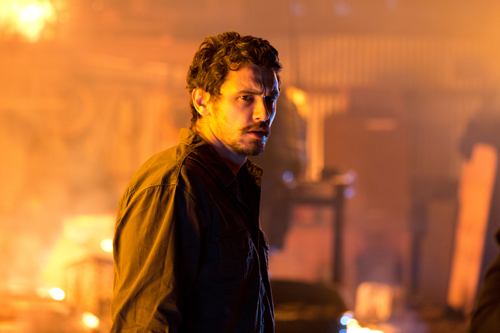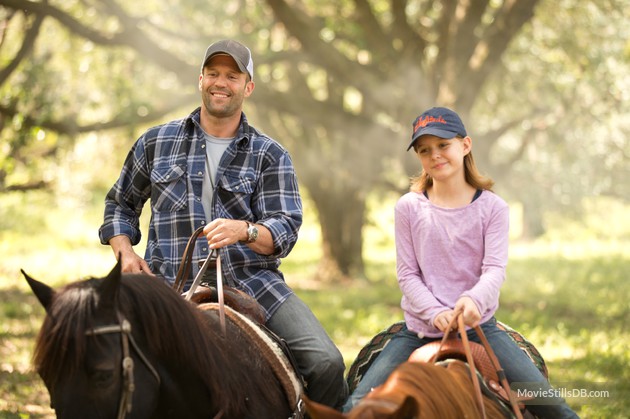
Jason Statham has carved out a nice niche for himself as the hard-as-nails action hero of our day. In this Homefront (2013) movie review, I discuss the merits of this collaboration with Sylvester Stallone. Since Statham’s early roles in Guy Ritchie’s Brit-Gangster hits ‘Lock, Stock and Two Smoking Barrels‘ and ‘Snatch‘, a steady stream of solid work has been coming his way. I suspect that viewers will find his films either engrossing … or deeply annoying.
I’m squarely in the first cohort. In “Homefront”, Statham pulls off something a bit rare: he portrays a strong-man in a story with some real social relevance. It would be easy to dismiss “Homefront” as a formulaic, mindless actioner. But honestly, it’s more than simply that.
The film sets its tone early. Statham plays Phil Broker, an undercover narcotics agent. We see him and his crew bust open a crystal-meth production lab. The sting culminates in a disastrous showdown, during which the crime boss’s unhinged son is violently killed by the authorities. The enraged father sets a death-wish on Statham (and his family) as he’s dragged kicking and screaming into custody.
Cut to Phil’s new life in the deep south of America: he has a new identity, and has moved to no-man’s land to protect his young daughter from the drug-lord’s threatened recriminations. Also recently a widower, Phil buys an old house in the woods. It’s a real “fixer-upper”. His daughter Maddy settles into the local school, and Phil gets to work rebuilding his house’s porch with his buddy. Hrm: this is a guy who just wants to be left alone.
We see an early encounter involving daughter Maddy. A cautious girl, she is nonetheless confronted by a bully in the school playground. He begins to be harass her. Maddy politely asks him to lay off – twice – to no avail. After being ignored for the second time with a rough shove, Maddy sighs and sets about kicking the boy’s ass – busting his nose open like a ripe tomato in the process.
I love scenes like this. Bullies exploit one of the most insidious childhood wounds of their victims: an deeply-ingrained belief that they don’t have a right to fight back – that they don’t deserve to stick up for themselves. But Phil’s daughter Maddy is no such victim. She knows how to assert her boundaries – and defend them. Daddy has taught her well.
Ofcourse, fighting back with this kind of violence raises all sorts of questions. Was Maddy justified in busting the boy’s nose? Should she simply have taken the moral high-ground by reporting the incident to her teacher? Delightfully, “Homefront” doesn’t dodge any of these questions. Infact it tackles them head-on. The question of whether violence is ever an acceptable response is front-and-center throughout the story. And this is very much to the film’s credit.
Understandably, Maddy’s idea of rough justice can’t go unnoticed. Phil is called into school to collect her and answer a few questions from the local Sheriff. Here is a disquieting scene in which the bully’s mother (an initially-unrecognizable Kate Bosworth) develops an immediate emnity for Phil.
Pivotal Scene: Outside in the parking lot, the mother’s rage hits boiling point. It all culminates in an ugly encounter: Dad is forced to repeat the humiliation just meted out by his daughter. This time, Phil has to unleash on the bully’s own father: a hapless loser, forced into confronting Phil by his shrieking, rageful wife.
We’re barely even 15 minutes into “Homefront”. Yet already there are several interesting characters in the mix. Belying the formulaic appearance of this film, the story has substance and moves along at a decent clip. With a screenplay penned by Sylvester Stallone, it’s a bit of a diamond in the rough.

Take Bosworth’s “Cassie”, for example. I felt she was mis-cast as Lois Lane in Bryan Singer’s largely-misunderstood “Superman Returns” (2006). She felt wooden and subdued in that role (an attempt, I suppose, to portray a more vulnerable ‘Lane than Margot Kidder’s thunderbolt from the 1970s Superman movies).
But Bosworth’s performance here – as a drug-addicted mother with severe Borderline traits – is impressive and unsettling to watch. Hers is but one of several decent acting turns in “Homefront”. I’ve focused on it here because her unstable personality is pivotal to the plot turns. The story arc followed by Cassie’s character is believable. Simply through her facial expressions, we see her go from rage, to ambivalence, to genuine inner-conflict in terms of her attitude towards Staham’s “Phil”.
It’s Cassie’s initial rage, infact, which sets in motion the chain of events leading to the film’s dramatic climax. Having just suffered the double-humiliation of her husband and son at the hands of Phil and his daughter, she calls upon her bad-boy brother to implore him for revenge. That revenge which in her enraged state – fleeting though it may be – she so desperately craves.
Can you see where this is going?
And so we’re introduced to the other lead in the film. Cassie’s brother “Gator Bodine” is played by James Franco. I loved Franco’s performance in Danny Boyle’s “127 Hours” (2010). For me, it surpassed even Tom Hanks’ one-man-virtuoso showing in Bob Zemeckis’ excellent and heart-breaking “Castaway” (2000).
Here, Franco portrays a local thug who heads up a crystal-meth lab – much like the ones Phil used to stamp out in his former life. And so another story thread is neatly woven into the overall narrative. It’s a solid piece of writing.
The establishing scene for Gator is ominous and brutal. I find Franco to be an interesting actor, in that his characters are often deeply ambiguous. Are we looking at a good guy who got lost along the way? Or a loser who can barely make it to the end of each day without a struggle? So it is with Gator. He’s at once intimidating and strangely pathetic. We almost feel abit sorry for this lost soul. Great stuff.
There are scenes of very strong violence in this movie. I’m not a big fan of such beat-downs in general. Here, the use of violence feels largely warranted (as opposed to being entirely gratuitous). Violence is being used to make a point.
Take, for example, an early confrontation at a gas station. Two of Gator’s minions pick a fight with Phil (following executive orders from the boss, of course). Once again, Phil holds his nerve – giving them several chances to back down. When they don’t, Phil teaches them a lesson. Except that these guys are really slow learners.
In an example of how much care has gone into this screenplay, there’s a later scene in Homefront which beautifully provides the motivation for Cassie’s son – the bully in the early scene with Maddie described above. At first, we see in this kid a vindictive bully, who picks on Maddy … just because she’s the new kid in school. We really don’t like this boy.
Later on, we witness a bitter confrontation between Cassie and her brother Gator on the doorstep of her house. During this argument, the camera cuts to the son. He is sitting inside the house just next to the window, listening to his mother’s expletive-laden outburst on the deck.
The son’s face says it all. He’s confused, scared … and lost. Is it any wonder, then, that he carries such rage into the school corridors, to be unleashed upon his fellow students? This is insightful stuff. Few films would include such attention to detail for a peripheral character – let alone an “action” movie like this. That “Homefront” takes a few moments to do so lends credibility to the unfolding story.
The film has several moments where it could have descended into absurd exaggeration or mindless action. Yet it remains restrained and well-paced throughout. I’ve only mentioned a few of the central performances here, but you’ll be treated to several others in the film.
Take Clancy Brown’s earthy, steadfast turn as the well-meaning Sheriff who’s probably not as straight an arrow as we’d like to believe. Or Winona Ryder as Gator’s girlfriend. She plays a conflicted girl with a dark past. And despite her wise warnings as to the folly of Gator’s “master plan”, she ultimately wields few defences against his sociopathic demands.

Likewise, the chemistry between Phil and his daughter Maddy is genuine and warm. One of her schoolteachers takes a shine to Phil on their first encounter. Maddy gently probes and teases him about this in several delightful moments during the film, showing us a daughter who at once loves her dad and worries for his happiness in the wake of her mother’s passing. Very nice.
There’s much to enjoy here, and I’ve only scratched the surface in this ‘Homefront’ movie review. I don’t think you’ll be disappointed. Production values are high throughout. If you’ve got a Dolby-Digital sound system, crank up the volume for some excellent motorcycle rumbles and other atmosphere sound effects during the many outdoor scenes in the film.
(Tags: Borderline Personality Disorder, Healthy Boundaries, Drug Addiction, Action-Drama.)

Leave a Reply